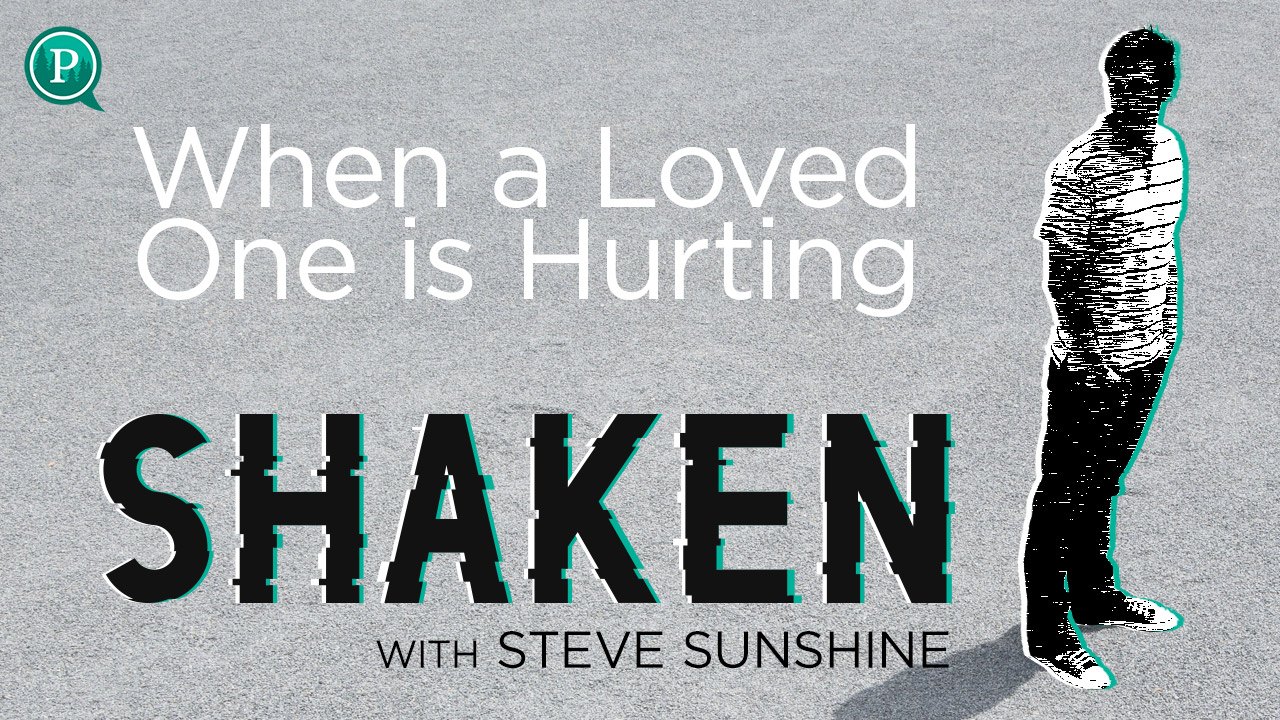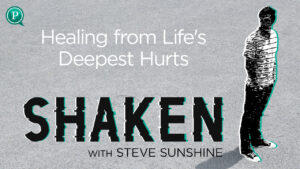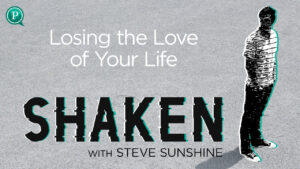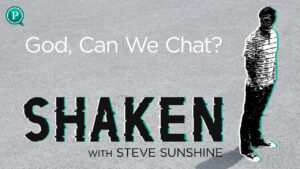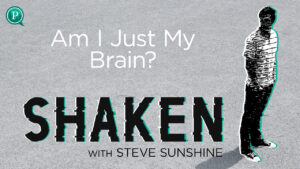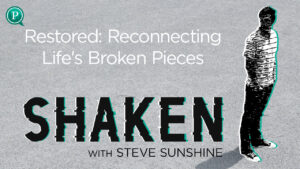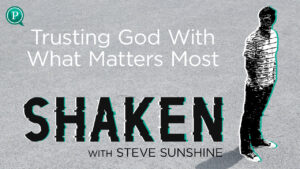In this episode you will hear more about Steve’s journey with Parkinson’s disease. He is also joined by podcast guest, Mike Weston. They talk about how Mike’s son’s life-threatening illness impacted him and how God led Mike, his wife Donna, and his son Ryan, through it all.
Transcription:
Steve Sunshine:
We live in a time of unprecedented comfort. We value safety and security, and maybe that’s why it’s so easy for us to be shaken when the straight road we’re on takes a sudden curve and seems to be pointing us in a direction we don’t want to go. Welcome to the Shaken podcast. I’m Steve Sunshine. Your confidence, your mood, your perspective, even your faith maybe shaken because of something that’s happened in your life. Jesus told us we’d have trouble in this world, so we’re shaken but not surprised. He also said, “Take heart, I have overcome the world.” In this podcast, you’ll hear honest conversations with people who have or are going through life altering hard times, and have found that God was with them in the midst of it all. What can be harder than going through a serious health crisis? How about watching someone you love go through one? That’s what we’re going to talk about with today’s guest coming up. But first, well, for me, I was the one with the unwanted diagnosis.
In the moments after being diagnosed with Parkinson’s disease, something new loomed in my mind, “How was I going to tell my wife, Gay?” Having to deliver this news was more frightening in that moment than the disease itself. The phone rang in the car as I was driving home. It was her. I didn’t pick up. This wasn’t something I wanted to say on the phone. When I drove up to the house, she came out the front door. She said, “What is it?” I said, “Let’s go inside,” and I told her, and we both cried for a long time. And then she said something that I pray that anyone who has this kind of diagnosis hears. She said, “I’m not going anywhere. I’m in this with you, and whenever you need it, I’ll take care of you.” That statement is a portrait of love, and I’m so grateful for Gay. Our guest on this episode is Mike Weston. He’s a radio personality and voice actor living in South Carolina. And full disclosure, Mike and I worked together at a radio station and spent much of our time sharing our mutual love for the Marx Brothers.
Mike Weston:
That’s right.
Steve Sunshine:
Thank you for joining us, Mike.
Mike Weston:
My pleasure. Thanks for the invitation.
Steve Sunshine:
Mike’s son, Ryan, had some very difficult medical issues through his teen years or even earlier, and that’s what he has suffered through. When did that start? Was it childhood or when he became a teenager?
Mike Weston:
Yeah. Ryan actually was born with a very severe congenital heart defects. So his first heart surgery was at three days old, and then he had three more heart surgeries under age four, so that was the beginning. Those first four or five years were quite something. And we found out later, interesting, we were meeting with his surgeon who did all those surgeries. We met with him many years later because he was doing another procedure for Ry. He said, “I’m just curious. Back in 1987 when we talked about Ryan’s first surgery, what kind of odds did I give you?” And we both remembered, both Donna and I very clearly, he said 40% chance of surviving that first surgery. And he looked at us and smiled and said, “I was being generous at the time, it was probably a lot less than that.”
Steve Sunshine:
See, I don’t want to hear the doctors do that.
Mike Weston:
I know, right? Just tell me. We had been told, “Hey, just try to prepare yourselves. He could be in the hospital for up to a year after this first surgery,” and so we did. I mean, we tried to wrap our heads around that. And to your point about, I just think lots of prayers by lots of people and God’s mercy and kindness, he was home in less than a month, so it was pretty amazing.
Steve Sunshine:
But the challenges continued. I can remember a day that I was off at a conference and you called me from the ambulance. I could hear the sirens going in the background, and we had to scramble and change some plans, but the important thing was getting him taken care of.
Mike Weston:
So he really, from about age four or five, Steve, up until really middle school, early high school, Ryan did really well. He didn’t have any real significant issues, although he started to develop learning disabilities, which we knew was a possibility based on the multiple surgeries and being on what’s called a heart lung machine and a ventilator and all that. So the occasion you’re talking about was probably really late teens when he developed some real serious heart arrhythmia, which ultimately led to him getting a device, a defibrillator pacemaker implanted in his chest to keep him safe.
Steve Sunshine:
Give us an idea of what that was like for you and Donna, your wife. It was a marathon because you had the early days and then it’s back when he’s a teenager. What was that like on your soul and on your spirit?
Mike Weston:
Yeah. That’s a great question. I mean, the early days, looking back on it now, we were so fortunate in so many ways. Not only did we have, I think, some of the best medical care on the planet, let alone in the country, but we were a part of a wonderful church family at a part of the vineyard movement at the time. And so I don’t know that we could have gotten through those first five years without just amazing friends comforting us and bringing us meals and visiting us in the hospital, and praying for us and all that. Those first five years were a blur, honestly. But because he was so little, because he was so tiny, I think we were in a mode at that point where we were just really doing our best to trust God, to take care of him, and trusting the medical staff to do the best for him.
The later years actually became a lot harder because once he got into middle school and he developed these learning disabilities, that led to a lot of really bad behavioral issues. And so to your point, I mean, probably one of the hardest things we’ve ever gone through with Ry was his behavior was so difficult and so dangerous. We actually sent him off to a residential boys school halfway across the country when he was 15, and he stayed there for seven months, and he will be the first to tell you that, that experience saved his life. He hated it at a time and we hated him being so far away, but that really was a redemptive experience for him. But it was one thing when he was three or four to be by his bedside every day and praying and hoping, it was another thing for him to be halfway across the country with strangers and wondering what could happen on any given day or given time, so that was a really difficult season for us and for him.
Steve Sunshine:
And how did you deal with that?
Mike Weston:
I think, again, the support of family and friends was so critical. I think when these kinds of things happen, I’m mostly an introverted guy, although I love being with people as well, but I tend to process things internally. I tend to quietly process things, and so what that can lead to is isolation, and trying to just tough it out and go through a situation by yourself. And I think that I didn’t always do it well, sometimes I did it better than other times. But I think when anything like this happens, I just think it’s so critical to reach out and to let others embrace you and support you. So we joined a family cardiac support organization, and it was really hard. I mean, it was really difficult and scary at times. Every parent’s worst nightmare is the loss of a child, and then I think after that is the serious illness of a child, and I just don’t think we could have done it alone. I think having community around us was really important, but even with that, it was very scary and very anxiety producing at times.
Steve Sunshine:
Did you have a sense of God’s presence or was there a time where you were asking, “God, where did you go?”
Mike Weston:
It’s interesting. There’ve been other situations in my life where I’ve looked heavenward and not shaken my fist, but looked heavenward and incredulously and thought, “Okay, what’s going on here?” But I never felt that way and I don’t take credit for that. I think it was just a mercy kind of a grace let of the Lord that I always felt like God was with us through this. I always felt as though he had Ryan in his hands. Not to say that there weren’t some really awful times and moments in later years, Ryan had to have brain surgery from a brain infection. He had a minor stroke. There’ve been other things that have happened, but the Bible talks about a piece that passes understanding, and I can genuinely say that that’s been the case, and it’s not because I’m so spiritual, I just think it’s just been a gift from God, a gift that I didn’t even ask for. It just has been there for us.
Steve Sunshine:
Wow. So I guess, we should… Because we haven’t touched on this yet, and if I were listening to this podcast, I might be wondering by now, “How is Ryan doing now?”
Mike Weston:
He is doing remarkably well. Oh, my gosh. So just to catch it all up, in his early 20s, he developed severe chest pain, and so we had about a decade of that, and that was a lot of ambulance rides and a lot of emergency visits. He went through a period of time in his 20s where he was reliant on very strong pain medications for that reason. But he got to about six years ago when he was 32, he really recommitted his life to Christ. And he will tell you, he told me, “Dad, I decided to go from sorrow to joy. I can’t keep living this way.” So likewise, I don’t think Ry ever blamed God so to speak, but I think he questioned God a lot and I think he felt like he had to just soldier on by himself.
So about five or six years ago, he made a recommitment of his life. He got baptized, and he’s always been an amazing person for all the reasons we’ve talked about, but really the light just came on and you could see the change and the redemption in him. And he got married about a year ago. He’s doing really well. Three years ago when he had that stroke, we almost lost him. He stopped breathing for a period of time at home and he ended up being okay. But he works part-time in landscaping at a golf course, which he loves. He loves being outdoors. He loves all kinds of creatures, and he’s really doing well, and he has a wisdom beyond his years, I would say that as well.
Steve Sunshine:
I’m Facebook friends with Ryan and his feed is just full of joy, so I love seeing anything he posts.
Mike Weston:
He’ll be the first to tell you, like all of us, he has down portions of days or whatever. But I think that the lesson to learn from Ry as his dad and as his friend is, I think he really just makes a choice every day. He just makes choices every day. He chooses faith, he chooses joy, he chooses forgiveness. He chooses to let go of the past. It sounds a little cliche or a little overly simplified, but I think that’s really what it comes down to. I think if you asked him, he would just say, when he gets up in the morning he knows he has to choose life, and that’s what he does.
Steve Sunshine:
Are the medical conditions, is that done or is he still at risk of having more episodes?
Mike Weston:
So he’s at fairly high risk of seizure and stroke because of the cardiac issues, so that’s always a possibility. He takes anti-stroke medication. He’s certainly at a much higher risk than you or me of various medical events, but I think considering all he’s been through and considering the diagnosis and all that, he’s remarkably stable.
Steve Sunshine:
Yeah. I’m sure among your prayers over the years has to have been, “God, do a miracle, take this away.” And it looks like he’s given you several miracles. Not exactly that one, but one is longevity, and of course, the other is the big one, which is that he came back to the Lord.
Mike Weston:
Yeah. He came back to the Lord, and we have such a close relationship because of the fires we’ve been through. I think with him, we can talk about anything any day, all day long if we had the time. And I think one of the things that I’ve made peace with, famous last words, is that there is mystery in life and there are things that we don’t understand, that we will not understand this side of heaven. And I think the more I began to make some peace with that reality, the healthier I’ve been mentally, psychologically, spiritually. So if I had any unrequested advice for anybody, I think I would talk about mystery a little bit, and that it’s really a part of the human condition.
Steve Sunshine:
A God that we could understand would probably not be a God that we would worship.
Mike Weston:
Yeah. I think that redemption has come out of all of this in many ways. One of the ways that I was thinking about this morning was when these kinds of things happen, when there’s suffering, when there’s inexplicable suffering, it gives all of us as other humans the opportunity to really love and embrace and care for, and reach out to other people, to people as they’re suffering. And it’s a wonderful, amazing thing, that kind of community and that kind of care and love, and these kinds of things often prompt that at a much higher level than they would normally be there. So I have to think that that’s part of God’s plan ultimately.
Steve Sunshine:
Yeah. Has there been a situation that you can think of where you’ve been able to use your experience and say to somebody, just to give them some counsel about how to respond to whatever had happened to them?
Mike Weston:
Yeah. In fact, ironically, and I hadn’t thought about this in a long time. About five years after Ryan was born, there was another family in our church in that same church, and they had a son born with very similar heart defects, and so we were able to help them walk through that a little bit. I’m not sure how well we did at it, but the most powerful thing, I think if I recall, that they told us was just us being there for them in the suffering, in the pain, in the experience, not so much coming up with solutions or advice or input or wisdom, but just being present.
Steve Sunshine:
Well, and that’s so smart because first of all, you’re hearing this all the time. Some people when they’re going through something hard, they usually just want you present. I mean, if you have the solution, that’s great, but it’s very unlikely that as a non-doctor, you’re going to go, “Well, what they should do is do this test and that sort of thing.” And it’s so interesting how God uses us to help each other through situations that we’ve been through with the added benefit of, “I can identify with your pain,” when God himself did that for all of us in Jesus when he came and lived, not an easy life by any stretch of the imagination and went through hunger and pain, and betrayal and all sorts of things like that so he can look us in the face with all honesty and say, “I know how you feel. I’ve been there too.”
Mike Weston:
You know what that makes me think of too, Steve, and I hadn’t thought of this in a while. Maybe people know the story a little bit about Jesus and Lazarus in the New Testament, and that Lazarus dies. And so here’s Jesus who’s the creator of the universe and the healer of all, and he chooses to raise Lazarus from the dead as I recall, but there’s also that shortest verse in the entire Bible that says, “Jesus wept.” And so somehow, even as the God of the universe, he took that moment to empathize. He felt, as you were saying, the same kind of pain of loss of a friend. And I just think it’s significant that, that made it into the Bible, this moment where there’s this loss and this pain, and those two words are in there.
Steve Sunshine:
What would you say to somebody who has just gotten some news, whether it’s a divorce or the loss of a job, or a diagnosis or the loss of a loved on, or a sick child? What would you say to that person as they look and maybe say, maybe they’re thinking, “Why me. God, why would you do this? What am I going to do next?”
Mike Weston:
I think that there are multiple levels to respond to things like that. I think there’s certainly the emotional response, the emotional level, and I think we need to fully feel those as much as possible, the sadness and the fear and all of those things. But I think as Westerners, we like to solve things. We like to have formulas. We like to have spreadsheets. We like to have A plus B equals C, and that’s fine for a lot of life. But to answer your question, I think when these kinds of things happen, even though it’s a natural response, I think the response of why or figuring this out or figuring out solutions is probably pretty non-productive, there’s a place for it in finding diagnoses and finding solutions.
But I think it’s a more first century biblical approach to say, not why, but what or how. “What does this mean for my life now?” And maybe solutions will come, maybe clarity will come and that will be a bonus, but that’s not what I’m seeking. I’m seeking to love this other person who’s suffering or to love myself, or to allow myself to be loved and to do my best to accept that, again, there is this mystery in life, and not everything can be defined with numbers and data, and answers like that.
Steve Sunshine:
Yeah. It sure is something that we need to hear as we go and respond to situations that are maybe unwanted, and try to live faithfully in obedience to God, but knowing that we don’t do so alone, that he’s with us and hopefully we are in community and there are people chosen by him to be the right people to walk through it with us as well, and sometimes just to sit and listen.
Mike Weston:
And I have, and I am sure you have too. I’ve had that modeled in my life. I’ve been very fortunate that way during the particular season where Ryan was trying to get off of these very strong pain medications, but cope with the pain. I had a dear friend in our lives, and I just remember, like we’ve said, he was just there to be with me. He was not trying to give me answers or solutions, and he really had a way of making us feel embraced and loved and cared for in the midst of the tragedy of it all. And it’s such a warm, powerful memory, and I certainly just hope that in some small way, I can do that for other people in those moments in time when they come.
Steve Sunshine:
Such a good way to look at it. Thank you, Mike. And so glad that Ryan is doing better. And hey, God bless you guys, your whole family, Donna and the boys.
Mike Weston:
Oh, thank you, Steve. It’s been a pleasure. And I think the podcast is going to be fantastic, and it’s going to help a lot of people, so I’m glad to have been a small part of it.
Steve Sunshine:
Thanks, Mike. And thank you for joining us for Shaken. Hey, we can use your help if you’ve been encouraged by what you’ve heard, please like and share Shaken, and if you don’t want to miss any episodes, click subscribe. Otherwise, you can find us at purposely.com and wherever you get podcasts.
Follow this podcast:

